Opinions & Features
A well-deserved but bittersweet victory for Jack Catterall
Published
4 months agoon
By
J. Humza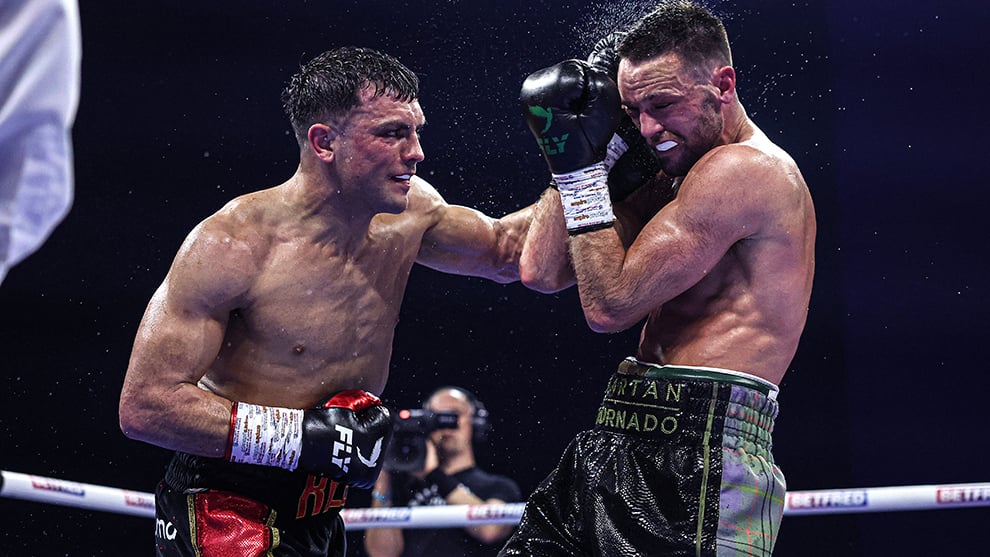
TWICE now the ringside officials have ruined Jack Catterall’s evening, albeit in two very different ways.
The first time around they somehow managed to make him the loser in a fight he clearly won, while last night (May 25) in Leeds they corrected that mistake by forcing him to a wide victory in a fight that was clearly close.
For Jack Catterall, this may seem like a kind of justice until we realize that sometimes winning a close fight by a huge margin exposes the victorious fighter to the same criticism as winning a fight he didn’t deserve. . If the scorecards (117-111, 117-111, 116-113), for example, had been closer, Bob Arum, Josh Taylor’s promoter, would not have been allowed to ambush him during post-fight interviews and shout that the decision was a “disgrace.” ” and I promise he will never allow his fighters to box in the UK again. And as it was, with the judges apparently trying to overcompensate, Catterall, beaten by Taylor almost two and a half years ago, rather unfortunately felt that he had both won the fight and done him a favor.
Moreover, at the end of the fight Catterall was completely candid. For example, when he was asked how he felt about securing his revenge, he described the decision victory over Taylor as “bittersweet”, referring to the fact that no world titles were on the line this time. (Of course, the last time they fought, Catterall may have won more than one super lightweight belt.) “But I won this fight,” he said last night, “and I can close this chapter with Josh Taylor. I believe I won this fight; This time I took a bigger risk, I switched to a higher gear. I controlled the pace and landed cleanly. It was a fight of two halves, but I still think there were rounds in the second half that I won.
Which, honestly, is probably the most exact reading of this fight. It’s certainly better than the two judges’ and Bob Arum’s interpretation of the fight, and by admitting it was a two-halves fight, it lends credence to my seven-to-five-round scorecard (in Catterall’s favor).
It was a close fight, yes, but Catterall still deserved to win, and not just because he was robbed of victory in 2022. He deserved to win the rematch because overall he was the one who created the more eye-catching moments, used his jabs more effectively, and provided the final momentum shift in the fight by hurting Taylor in round 11. This, in fact, proved to be the key turning point in both this round. as well as throughout the fight. By then it was very close and you could argue it was even, and yet in that round, the 11th, Catterall threw a huge overhand shot to the left – he threw blindly as he dipped low – which caught Taylor blushing on the way to center and shook it to its foundations. That in itself was a breakthrough moment for Catterall, as it was the first truly devastating shot of the fight, but what made it all the more significant was the fact that Taylor had gained steam in the same round and appeared to be on his way to victory. So hurting Taylor and regaining his momentum was everything for Catterall, and indeed, if it weren’t for the judges’ absurd scorecards, it would have been considered a fight-changing shot.
Catterall lands left (Mark Robinson Matchroom Boxing)
As it happened, Catterall, now 29-1 (13), didn’t need a large left hand in round 11 because he was going to win anyway. Of course, he didn’t know it at the time, but his reaction at the end, when he mocked Taylor for daring to raise his hand, said everything about Catterall’s confidence in winning. Moreover, it showed the fear that history would repeat itself.
While this was not encouraging for either Catterall or British boxing, it was nonetheless engaging to compare the reaction to the decision this time around to the reactions in February 2022. This time around Taylor, the one who got lucky in the number one fight, could be seen shaking his head sadly as he learned of his defeat (the second of his professional career) and to some extent it was demanding not to feel sorry for him. Ultimately, both results were so bad that Taylor (19-2(13)) has every right to feel almost as dejected as Catterall after the pair’s first fight. Interestingly, last night in Leeds after losing the fight he was boxing much better than when he “beat” Catterall in Glasgow; something that becomes even more engaging when you consider that Catterall was probably better in fight number one than in fight number two.
In fight number one, Catterall did almost everything right, and the only blow he suffered was that he lost his touch later in the fight. He led Taylor in the dance for 12 rounds (abandoning him in round eight) and gave one of the best performances to be seen in a British ring this year, whereas the previous evening, perhaps due to sudden expectations, Catterall had not looked as loose or majestic. He still retained the same level of control he had when he faced Taylor in the first fight, but this time Taylor had low bursts of success that he largely lacked during his meeting with Catterall in Glasgow. There was more aggression on Taylor’s part, more body shots and more confidence in a lot of his work, and the element of surprise was gone. He was relentless at times, especially in rounds two and three, rounds where they butted heads because Taylor desperately wanted it to be a physical fight. But this pressure from Taylor couldn’t and didn’t last. In fact, in the fifth round, Taylor fell to the ground, the violent punches left him, and now it was Catterall who dictated the pace, throwing more punches and regaining the center of the ring. Now it was Catterall landing body shots that left Taylor gasping for air.

Taylor lands a left (Mark Robinson Matchroom Boxing)
Remember, these were mostly close rounds. Even many of the ones Catterall won didn’t win much, and the same could be said for the ones Taylor won; such as the seventh, who finished with a good left cross followed by a right hook to the body. Meanwhile, there was a moment in the ninth where Taylor put his hands down and Catterall fired off a series of five shots, once again bringing Taylor back to the ropes. However, in the 10th set, Taylor once again took advantage of Catterall’s suddenly destitute performance to hit some solid body shots and raise the momentum.
Ultimately, Catterall’s jab was the key. This, unlike Taylor, was the real point scorer and vigorous changer. This also resulted in his left cross, which of all the punches in the fight was by far the most damaging. It posed a threat to Taylor throughout the fight, and then, in the 11th round, a blow that almost knocked him off balance and ensured that this fight would avoid a repeat of the controversy from two and a bit years ago.
Unfortunately, this was not to be the case. However, with these two, you get the feeling that no matter how many times they fight and no matter how their fights go, there will always be a feeling that one fighter leaves the venue and goes home feeling tired. I suppose that’s the nature of two great rivals.
You may like
Opinions & Features
Enjoying the excitement of today’s heavyweight landscape
Published
7 hours agoon
September 28, 2024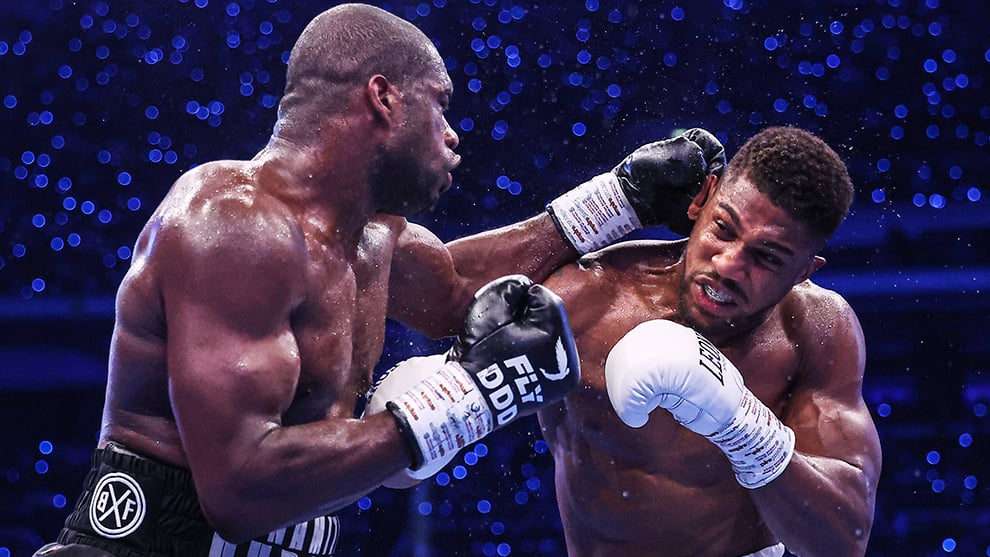
AS the dust begins to settle on last weekend’s huge fight between Anthony Joshua and Daniel Dubois, it’s worth taking a step back and looking at just how unpredictable the heavyweight landscape has become in recent years.
Although the fight was not a Hagler-Hearns war as several boxing leaders had suggested, and was in fact more of a one-sided beating, it was still extremely shocking and stimulating.
Just like when any top heavyweight fighter loses in this era, there will always be a vast section of people criticizing him for how he has been exposed, overrated and, of course, how needy the era of heavyweights is.
There were enough topics in the comments that appeared on my social media during the huge heavyweight fight and honestly, I don’t understand the criticism at all.
LONDON, ENGLAND – SEPTEMBER 21: Daniel Dubois punches Anthony Joshua during the IBF world heavyweight title fight between Daniel Dubois and Anthony Joshua on the Riyad Season – Wembley Edition card at Wembley Stadium on September 21, 2024 in London, England. (Photo: Richard Pelham/Getty Images)
Currently, Oleksandr Usyk is beating top fighters after a great cruiserweight performance to establish himself as an all-time great and undisputed king, albeit temporarily due to boxing politics. The UK is led by popular, stimulating champions Fury and AJ, whose weaknesses add drama to their fights.
They have both beaten top players and failed on other occasions. However, their impact on the sport, selling out stadiums and delivering all-time classics on many occasions, has once again brought heavyweight boxing to the forefront of British sport. Add to that Daniel Dubois, the newly crowned IBF champion, as well as a man who endures an unexpected series of devastation and bounces back on his own after two crushing defeats.
It’s strange to think that Joe Joyce had just beaten Dubois and Parker by stoppage and then been beaten three times in the last four, with those he toppled being at the very top of the tree. Coincidentally, Joyce was derailed by Zhang and Chisora, two men Parker defeated! That’s the nature of the game, especially for the huge boys – style creates fight.
Fury easily demolished Chisora three times, only for Chisora to give Usyk his toughest fight, and Usyk then goes on to beat Fury. Dubois, who was stopped by Usyk, attacks AJ, the same AJ who went the distance with Usyk twice.
Ngannou and Wallin worry Fury. AJ drops them off. Joyce stops Parker before Zhang kicks Joyce out twice, only to lose to Parker. Every era has these stylistic contradictions. Look how easily George Foreman took down Ken Norton and Joe Frazier, two men who gave Muhammad Ali absolute nightmares, only for George to be tactically outsmarted and stopped by Ali.

Joseph Parker lands a right hand at Zhilei Zhang during their heavyweight fight in Saudi Arabia (Richard Pelham/Getty Images)
It’s not the greatest heavyweight era in history, but it’s particularly good and incredibly fascinating. When you have an overview of the entire era, you can include the intrigue of Deontay Wilder, who, despite lacking solid boxing fundamentals, at all times possessed great KO power in his right hand that could aid as an equalizer in any fight.
Andy Ruiz, with a combination of quick hands and a desire to create Mexican history despite the odds, caused an upset. Dillian Whyte has entertained us on many occasions. Add to that the likes of Povetkin, Chisora, Parker and Joyce who caused problems for the main players when given the chance to play.
Add to that fighters like Zhang, Bakole, Kabayel and Hrgovic chomping at the bit to get into the title fight, and alongside names like Moses Itauma, Fabio Wardley and Frazer Clarke breaking through, you’ve got a lot of fighting left to do. division and many explosive matchups to come.
This is due to the murky era of heavyweight boxing ruled solely by Klitschko, whose dominance in an era of few worthy challengers and even fewer great fights ensured a numb period in the glamor division.
Even in the early 1980s, it was all Larry Holmes, the 1940s were ruled by Joe Louis, and the 1920s were ruled by Jack Dempsey, who, while making an incredible impact on the sport himself, only defended the heavyweight title five times in six years.
This isn’t the 1970s or 1990s, which were the greatest eras in heavyweight history, but they are very fascinating, with top champions, ever-changing supremacy, great fights, and a lot of really perilous, stimulating challengers.
Anthony Joshua lost to a better man on Saturday night, it’s happened before, but he also defeated a lot of proven good fighters and left a very influential legacy in British boxing, both in and out of the ring. While it’s not the greatest era of heavyweight boxing in history, all things considered, it’s certainly one of the better ones.
Opinions & Features
“There’s no way I’m losing to Ryan,” says Mikaela Mayer
Published
2 days agoon
September 26, 2024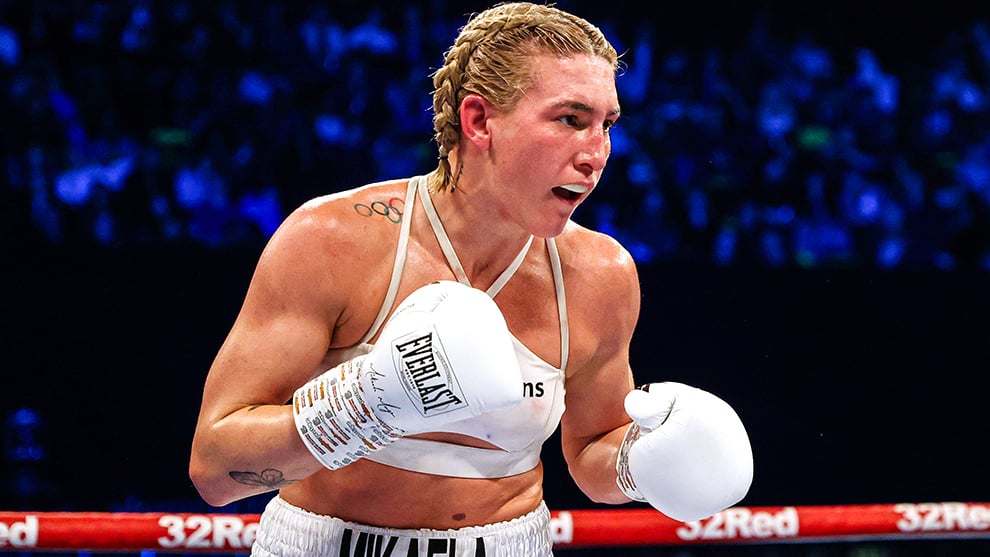
Mikaela Mayer is gearing up for another week of huge fights.
There is some edge to it, though. A developing grudge. A war of words with opponent Sandy Ryan over the alleged betrayal of a former trainer who crossed the street to work with her now-fierce rival. The WBO welterweight title you feel is just part of what is at stake tomorrow night in Up-to-date York.
Mayer comes alive when a camera turns on or a microphone is placed near her. A promoter’s dream. A competitor with a seemingly endless supply of quotes worth millions of dollars.
I caught up with Mayer over Zoom just hours after she landed in Up-to-date York, with a full week of media commitments ahead of her. Before our interview, I had seen an aged quote in which she described herself as unpredictable. For the first time, Mayer paused for thought when I reminded her of something she had said a few years ago.
“I’m unrehearsed. I’m open. I can be unpredictable. I just live life to the fullest,” Mayer said.
I once described Mayer as a teenage rebel who found her cause when boxing came into her life. Her mother had a drinking problem. Demons to overcome. Her father eventually gained custody of Mayer and her two sisters when her parents divorced when she was just five.
“I had to take care of myself,” Mayer says of those formative years. “My dad worked all day, and my mom wasn’t around. I grew up quick. I always needed something, and I’m lucky I found something as extreme as boxing. Something that could hold my attention. Boxing has that extreme factor. That fear factor. It kept me on my toes, because I’m such an extremist. Boxing is demanding and scary. It was impossibly hard at first.”
Boxing caught up with Mayer when she needed it most. A typical teenager who liked to party a little too much. She didn’t come home for days. Playing bass in an all-girl rock band gave her some semblance of stability. She learned to play through repetition.
Black Sabbath’s “Iron Man” was the first song she learned to play. A natural risk-taker, Mayer carried that mantra with her throughout her life.
“I’m such an extremist. Unless something is extremely hard for me, I get bored. I get sidetracked. I seem to thrive on stress,” Mayer once told me. “I feel most comfortable when I’m not comfortable.”
Women’s boxing wasn’t in the same place it is now when Mayer started out in boxing, especially in the professional ranks. You could argue that she would have been better served by seeing how her music life would pan out than risking somehow carving out a career in boxing at a time when there probably wasn’t a career to be carved out, a side of the sport that was still viewed with apathy and indifference. But Mayer sensed she was born different. Her unregulated upbringing certainly helped her roll the dice.
“I always admire that thought process in me,” she says. “I always have it in me. I think the older you get, the more you don’t want to take risks. But as a teenage person, I had no fear. That’s how my dad raised me. He never tried to impose his rules or his opinions. Literally, ever.
“My dad was very laid back. It was a very passive way of raising kids. It gave me a lot of confidence. He never put me down. He never said no or instilled any fear in me. But when boxing seemed impossible, I didn’t have the attitude that a lot of parents instill in their kids.”
Mayer found what she needed in boxing. The seed was planted. Very quickly, she began dreaming of greatness.
“After just a few weeks of training, I wanted to be the best fighter in the world,” Mayer says. “I wanted to fight Gina Carano. At the time, she was a huge name and I wanted to fight her. That’s what I wanted to do. I knew right away what I wanted to do and I put everything into it. Looking back, I had so much determination. I didn’t want to hang out with anyone. I just wanted to train, eat right and do everything I could to be great.”
Mayer has always exuded extreme confidence. Those words carry conviction. They’ve turned her harshest critic into a believer. “I’ve always had that confidence,” Mayer added. “My mom was very eccentric. She made us go out on the dance floor. She made us perform and party with her. She took us places and to parties to meet people, because she liked to party. So we had to fall into that, and she created this social persona. Then my dad got custody, and we had a lot of freedom. We had to make our own decisions. We were thrown into certain circumstances where there weren’t a lot of rules to follow.”
Mayer took that confidence into her fight with Sandy Ryan this weekend. After two controversial losses to Alycia Baumgardner and Natasha Jonas in recent times, Mayer will be hoping for third time lucky against Ryan, a fight that will see the American return home after four consecutive fights in the UK. Mayer despises the “former” tag, and defeating Ryan would make her a world champion after two years without a world title under her belt.
The bookmakers can’t separate them, but Mayer sees it differently. “I’m just better. I’m just going to do whatever I want. There’s no way I’m losing this fight.”
Opinions & Features
Family opposition won’t distract former world champion
Published
3 days agoon
September 25, 2024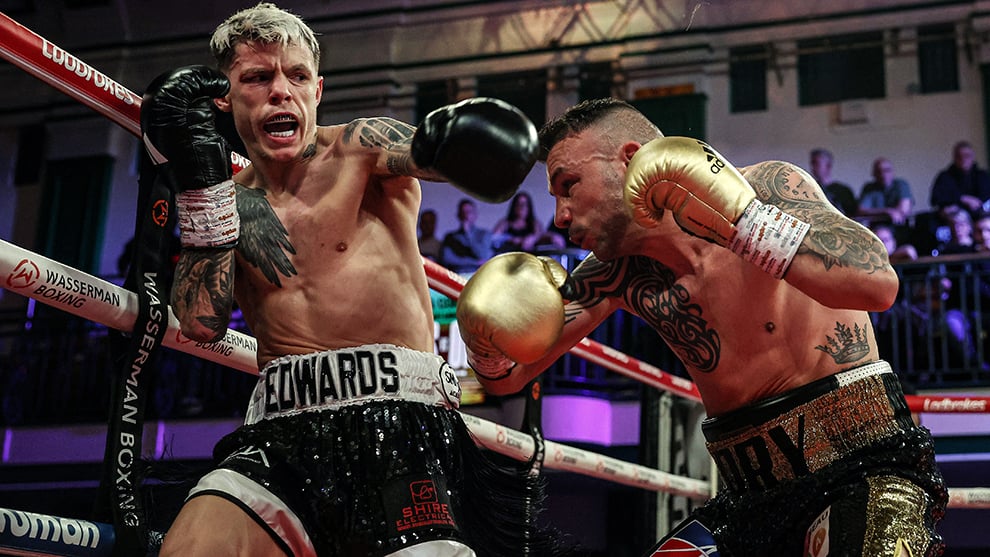
FIGHT PREPARATION typically focuses on two fighters jumping through the ropes, attempting to knock each other out.
How the fight came about, the personalities of the fighters, their careers and their predictions all play a part in the weeks, days and hours leading up to the first bell. But sometimes a storyline comes along that steps into the middle of it all and has its own punch that gets the spotlight.
On Friday evening [September 27] Charlie Edwards will face European bantamweight champion Thomas Essomba at York Hall, live on Channel 5. Edwards, a former WBC flyweight world champion, is the older brother of Sunlit, a former IBF flyweight world champion. Essomba v Edwards is a unique twist though, as in addition to his own boxing career, Sunlit has immersed himself in the managerial side of the sport, and one of his clients is… Thomas Essomba.
Although the thought of his brother in the opposing corner has left him a little rattled, Charlie Edwards has focused on the game and seems fully focused on his second fight with novel coach Stephen Smith.
“It’s a novel belt for me, it’s part of my heritage and my trophy cabinet at home,” he says.
“That’s the belt I really want and want to put in. Although my brother is in the visiting corner and he’s actually choosing Thomas’ side in this fight.”
Edwards spoke on Zoom just weeks before his 21st birthdaysaint fight knowing full well that his brother is a talking point in the supporting cast of two leading men. The 31-year-old spoke at length, moving between the European title fight and Sunlit’s place in all of this.
“We all know we’ve had some minor disagreements in the past, but I thought they were covered up,” he says.
Charlie admitted he wanted the fight personally. It wasn’t presented to him as an option, for example, after his points win over Georges Ory in April. However, Sunlit was pushing for the Essomba fight, which led to some back-and-forth, but the truth is Charlie wanted to face the EBU champion in his first fight after a 10-month layoff.
“All my attention is on Thomas,” says the challenger.
“Sunlit won’t bother me, he won’t shake me up. All I do is go to bed thinking about Thomas and wake up thinking about Thomas. In fact, I’ll probably end up missing him. So it’s all systems go in my favor. I’m ultra-professional, I always have been.”
However, Sunlit’s raw emotions on the other side haven’t gone completely unnoticed by his brother. Whatever those feelings are, Charlie knows that these are all business and special circumstances that are unlikely to repeat themselves in the future.
“He took his management career very seriously. Clearly, there was no wasted effort,” Charlie says of Sunlit.
“I’m grateful because it brings more eyes to this fight, which is what I need. Especially after all the inaction and politics behind the scenes that keep me inactive. I’ve put in a lot of strenuous work, grind and consistency over the past few years.
“I’m really looking forward to this fight because I feel like I’m entering the peak years of my career. I feel like my strength has skyrocketed. I’ve settled in [being] man, I gained a lot more weight than that.”
Edwards will return to York Hall this Friday. (Photo: Richard Pelham/Getty Images)
Edwards enters the fight with former two-time super featherweight world title challenger Stephen ‘Swifty’ Smith in his corner, and Edwards also gives the Liverpudlian plenty of credit in this novel phase of his career.
“He was the lithe I needed in my darkest days, giving me back my life and my confidence,” Edwards says of Smith.
“We all know his boxing brain is unmatched. His IQ in the boxing ring is top notch.
“The way he sees things, the way he explains them, and most of all, the energy that flows between us. We can be there doing 12 to 20 rounds in the gym. The entire time in the gym, I feel like I’ve been there for five minutes.
“That’s why I know he’s the guy for me. When you’re locked in and focused, the energy that’s being given just takes me to the next level. The knowledge that he puts into me and what he sees [in] My strengths and how I can employ them to the best of my ability.
“I’ve been working on a lot of other things that will come to fruition and shine on fight night. Now I’m forceful in the bantamweight division. Now I’m hitting. My feet are in the right place. I can only talk so much, but I have to walk and show it on fight night.
“It’s going to be a great performance, but also a terrifying performance.”

Brilliant Mikaela Mayer-Sandy Ryan fight ruined by pre-fight painting attack on Ryan

‘DUBOIS POLEAXED JOSHUA’ – Frank Warren praises DDD SPECIAL PERFORMANCE

😯 Ryan Garcia Reveals Gervonta Davis Conversation After KO Loss
Trending
-

 Boxing2 months ago
Boxing2 months agoLucas Bahdi ready to test his skills against Ashton Sylve
-

 Interviews5 months ago
Interviews5 months agoI fell in love with boxing again
-

 MMA4 months ago
MMA4 months agoThe Irish showed up in droves at the Mayweather-McGregor weigh-in
-

 MMA4 months ago
MMA4 months agoCris Cyborg ready to add a UFC title to her collection
-
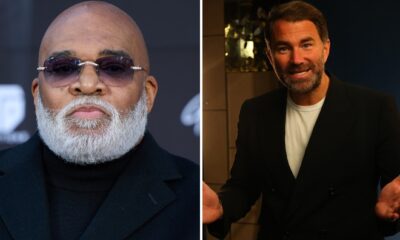
 UK Boxing5 months ago
UK Boxing5 months agoLeonard Ellerbe ends Eddie Hearn’s feud: I have to agree with him
-

 Video5 months ago
Video5 months agoFRANK MARTIN NEW MESSAGE TO GERVONTA DAVIS; WARNS HE’LL FRUSTRATE & BOX HIS HEAD OFF
-

 MMA4 months ago
MMA4 months agoMax Holloway is on a mission at UFC 212
-

 Video5 months ago
Video5 months agoJON JONES LAUGHS AT TYSON FURY & RESPONDS TO “BEAT ME UP” CALLOUT



